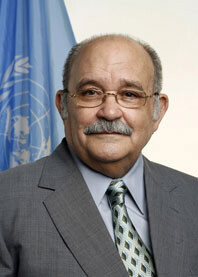The Electronic Intifada 3 December 2008

Miguel d’Escoto Brockmann (UN)
“What is being done to the Palestinian people seems to me to be a version of the hideous policy of apartheid,” he told delegates, during a meeting commemorating the “International Day of Solidarity with the Palestinian People.”
A senior UN official told IPS: “I cannot remember any Assembly president so publicly vocal in denouncing Israel.”Â
D’Escoto damned both the Israelis and the UN for the plight of the Palestinians. “And he was on target,” the official added.Â
“I believe,” d’Escoto said, “that the failure to create a Palestinian state as promised is the single greatest failure in the history of the United Nations.”Â
Nadia Hijab, senior fellow at the Washington-based Institute for Palestine Studies, told IPS that d’Escoto’s comments are a welcome reminder of the reality on the ground, and “a valiant attempt to hold the international community responsible for its posturing on the Israeli occupation of Palestinian land and siege of Gaza.”Â
She said Father Miguel’s “remarkable statement” carries more resonance given the silence of world powers.Â
“And his tenure still has nine months to go,” said Hijab, of d’Escoto’s stint as Assembly president, which expires in September 2009.Â
Addressing the Assembly last week, d’Escoto pointed out that it has been 60 years since some 800,000 Palestinians were driven out of their homes and property, becoming refugees and an uprooted and marginalised people.Â
The General Assembly, 61 years ago this month, adopted a historic resolution (181) calling for the creation of a Jewish State and an Arab State, he said.Â
“The State of Israel, founded a year later in 1948, celebrates 60 years of its existence,” d’Escoto said, “Shamefully, there is still no Palestinian State to celebrate.”Â
The New York-based Jewish Council for Public Affairs (JCPA) condemned the General Assembly for commemorating Palestine Solidarity Day and “deplored” d’Escoto’s remarks which “compared Israel’s policies in the Palestinian territories to South Africa’s apartheid policies.”Â
JCPA Chair Andrea Weinstein said: “It is terribly sad that the members of the General Assembly find it necessary to spend two days participating in programs criticizing a member states’ existence.”Â
It is even more “abhorrent,” Weinstein said, that the Assembly’s current president would seek to de-legitimize Israel by comparing its policies to those of apartheid South Africa.Â
D’Escoto has also come under attack for embracing Iranian President Mahmoud Ahmadinejad during the General Assembly sessions in September.Â
Israeli Ambassador Gabriela Shalev responded by calling d’Escoto an “Israeli hater.”
Stephen Zunes, professor of Politics and International Studies at the University of San Francisco, told IPS: “As most of us who have actually visited the West Bank in recent years can testify, it really is an apartheid-like situation, with Jewish-only settlements connected by Jewish-only roads with Arabs allowed in only for menial labor while their communities — divided by hundreds of Israeli checkpoints — languish in increasing poverty and deprivation.”Â
“Recognising this situation as it is and the critical importance of establishing a viable Palestinian state is not being anti-Israel, as an increasing numbers of Israelis themselves are recognizing, but is simply a reflection of reality,” said Zunes, who chairs the University’s program in Middle East studies.Â
Hijab told IPS that the Israeli occupation is now so dire that it has driven the most moderate of Palestinian leaders — Salam Fayyad — to speak out against European plans to upgrade their relations with Israel.Â
Fayyad, who is credited by the United States and Europe for his efforts to bring transparency to Palestinian financial transactions and security to Palestinian cities, said “the misery index in Gaza has never been higher” and that the world community is not telling Israel that there is a trade-off for internationally unlawful behaviour, she added.Â
Hijab commended the Assembly president for having the courage of his convictions to speak out against Israel.Â
Secretary-General Ban Ki-moon, however, diplomatically distanced himself from d’Escoto’s statement.Â
Asked for a response, his spokeswoman told reporters: “The Secretary-General cannot comment on a statement by the President of the General Assembly. The statement is his own.”Â
“And the secretary-general made his concerns about the Palestinian issue clear in his statement. I think his statement stands,” she added.Â
The United States-born d’Escoto was ordained as a priest of the Maryknoll Missionaries in the early 1960s. He graduated from the prestigious School of Journalism at Columbia University in New York, served for over a decade (1979-1990) as the foreign minister of Nicaragua, and is currently a senior adviser on foreign affairs, with the rank of minister, to the left-leaning Nicaraguan President Daniel Ortega Saavedra.Â
A gadfly who is forthright in his comments, d’Escoto also recently blasted the heads of both the World Bank and the International Monetary Fund for skipping a key UN conference on Financing for Development in the Qatari capital of Doha.Â
Without identifying the US by name, he said the two Bretton Woods institutions “are controlled by a member of the United Nations who is anti-United Nations.”Â
“It’s a shame,” he added.Â
At a press conference, he also said that US President George W. Bush came to the UN twice to address the General Assembly.Â
“But they did not even have the minimum politeness to acknowledge me — not once but twice.”Â
“He [Bush] spoke before the General Assembly, but he ignored me. He was the only world leader to do that. But I still love him anyway,” d’Escoto added.Â
The Assembly president ranks higher than the secretary-general in the UN totem pole.Â
And at international conferences, it’s the elected president of the General Assembly, not the secretary-general, who represents the UN’s 192 member states.Â
All rights reserved, IPS - Inter Press Service (2008). Total or partial publication, retransmission or sale forbidden.





